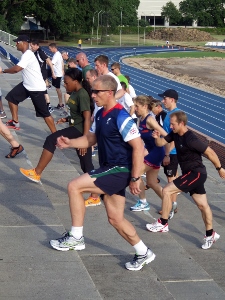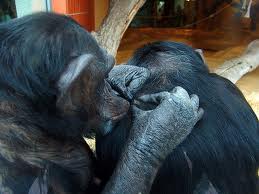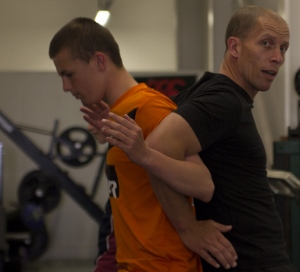Coaching community of practice
“Learning is a social phenomenon”
 Ever been on a course or workshop and struggled to implement the ideas you have learnt back at you club, team or school?
Ever been on a course or workshop and struggled to implement the ideas you have learnt back at you club, team or school?
Ever been on a course, thought I would like to know more, but the thought of going on a 3-4 day course is too daunting/ expensive?
Ever bumped into someone at a coffee break who gave a snippet of information that lit a light bulb and you thought “brilliant”?
Ever seen another coach or teacher do something and you thought “that’s really clever, I can use it”?
Me too. That is what a Community of Practice (CoP) is all about.
The opening quote is from Wenger’s work, who first came up with the concept that “sharing and hence, developing knowledge” is essential for learning (1).
You may well be part of an informal “community of practice” already. What follows are some more details and ways of making it more effective.
Interaction, participation and knowledge acquisition
 How do we as coaches learn? Is it an”Interactive experience with practical coaching concepts as the principal knowledge source of both neophyte and experienced coaches” ?(2)
How do we as coaches learn? Is it an”Interactive experience with practical coaching concepts as the principal knowledge source of both neophyte and experienced coaches” ?(2)
Compare that to a lot of courses which are fact acquisition and recital.
“People learn through the active adaptation of their existing knowledge in response to their contextual experiences, and the subsequent sharing of that knowledge.” and “learning is not viewed as an individual process and the direct result of teaching” instead “engagement in social practices is the fundamental process by which we learn.” (2).
When we understand this, it makes sense to put ourselves in situations where we can share, discuss and interact. For example, the difference between GAIN which is a CoP and the UKSCA conference which is “lecture driven” means one is a deep and meaningful learning experience, the other could be watched on video.
A cyclical practice of alternate action and systematic reflection is an important part of learning:
- Observation
- Interpretation
- Action
- Reflection (3)
Doing this on your own is part of coaching, but doing it with others sometimes is also important. “Sharing, and hence developing knowledge” is a fundamental concept of the CoP (1).
Three most crucial factors in an effective Community of Practice
 Dave Collins gave me these three pointers:
Dave Collins gave me these three pointers:
1. Common and well understood concepts and vocabulary. Makes sure you understand each other.
2. Common performance goals and parameters. Makes sure you talk about the right things.
3. Openness to discuss and consider-positive attitude to conflict, lack of “Preciousness” and all “IPR” issues addressed up front.
Makes sure you really discuss instead of mutual grooming!! (4)
Getting it done
 I was first introduced to the idea of CoP by Will Roberts when working with the South West Talent programme.
I was first introduced to the idea of CoP by Will Roberts when working with the South West Talent programme.
Will ran a few workshops and then tried to organise the coaches into “clusters“,where we would meet up and observe each other and share ideas.
Geography and time were against us, so it never took off, but I liked the idea.
It is something that I now do with all the coaches who have taken the Level 1 / Level 2 strength and conditioning course and also our partner coaches in the South West.
For example, Kevin Skinner, of the Exeter Harriers was a great contributor to our fitness testing workshop. He shared what he did as a jumps coach, and kept everyone from getting too excited about theory.
I run quarterly cpd workshops, plus use an online forum to facilitate the sharing/ discussing of articles, training plans or video clips from the coaches. For those participating, it has been a worthwhile experience.
Luckily, those contributing are really trying to develop as coaches, this then has an impact on their athletes/ players or pupils.
Want to know more?
Sign up to our newsletter and get regular updates on upcoming courses. Or contact James for details about running a course with your coaches.
References
- Jean Lave and Etienne Wenger (1991) Situated Learning. Legitimate peripheral participation, Cambridge: University of Cambridge Press.
- JONES, R. L.; MORGAN, K.; HARRIS, K. Developing coaching pedagogy: seeking a better integration of theory and practice. Sport, Education and Society, 17:3, p. 313-329, 2012.
- Allen, W. J. (2001) Working together for environmental management: the role of information sharing and collaborative learning. Unpublished Ph.D thesis, Massey University, New Zealand.
- Collins, D. Personal communication 29/9/13.

Thanks James. Interesting ideas and I am looking forward to see the information you got from the swimming workshop. I will give you feedback on the swimming camp on my return. Andy Ellis
A good read James.
I agree with you that the community of practice has been a worthwhile experience, as both the online forum and the Excelsior CPD workshops have helped, and continue to help, me develop as a coach.
Appreciate you taking the time and effort to set up this community of practice.
Thanks
Ollie W
Thanks Ollie and Andy for your comments and contributions: every time we share we get better.
[…] of the words from the Excelsior Community of Practice that describe the work or vision the coaches […]
[…] from Doug Lemov’s “Practice Perfect”. At the latest CPD workshop I ran for the Excelsior Community of Practice every coach got the chance to give and receive feedback on a session they delivered on […]
[…] you are interested in joining the Excelsior community of practice, then book onto one of our coaching […]
[…] shall continue to offer opportunities for coach education through our community of practice and will look to host a “biggie” later this […]
[…] called this his “Aha” moment after seeing Gary Winckler present (benefit of GAIN as a community of practice: learning from other […]